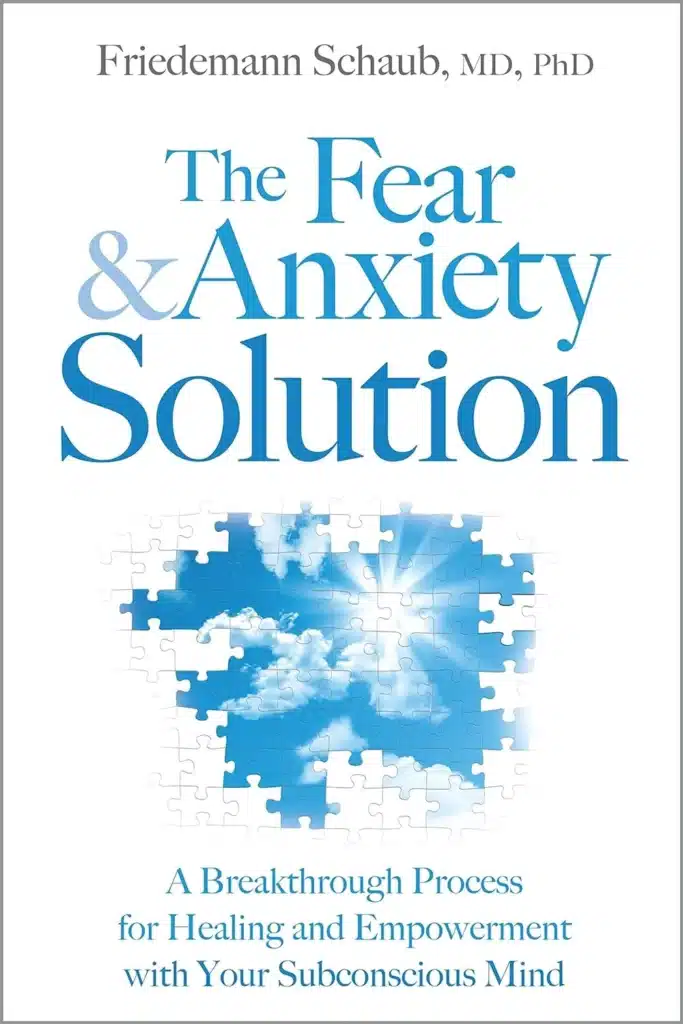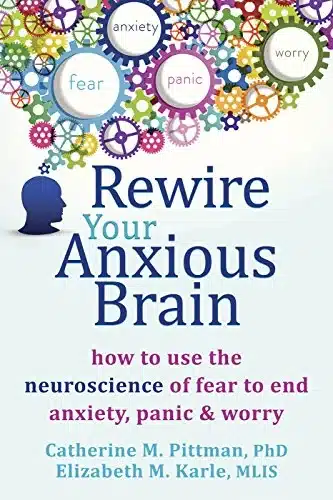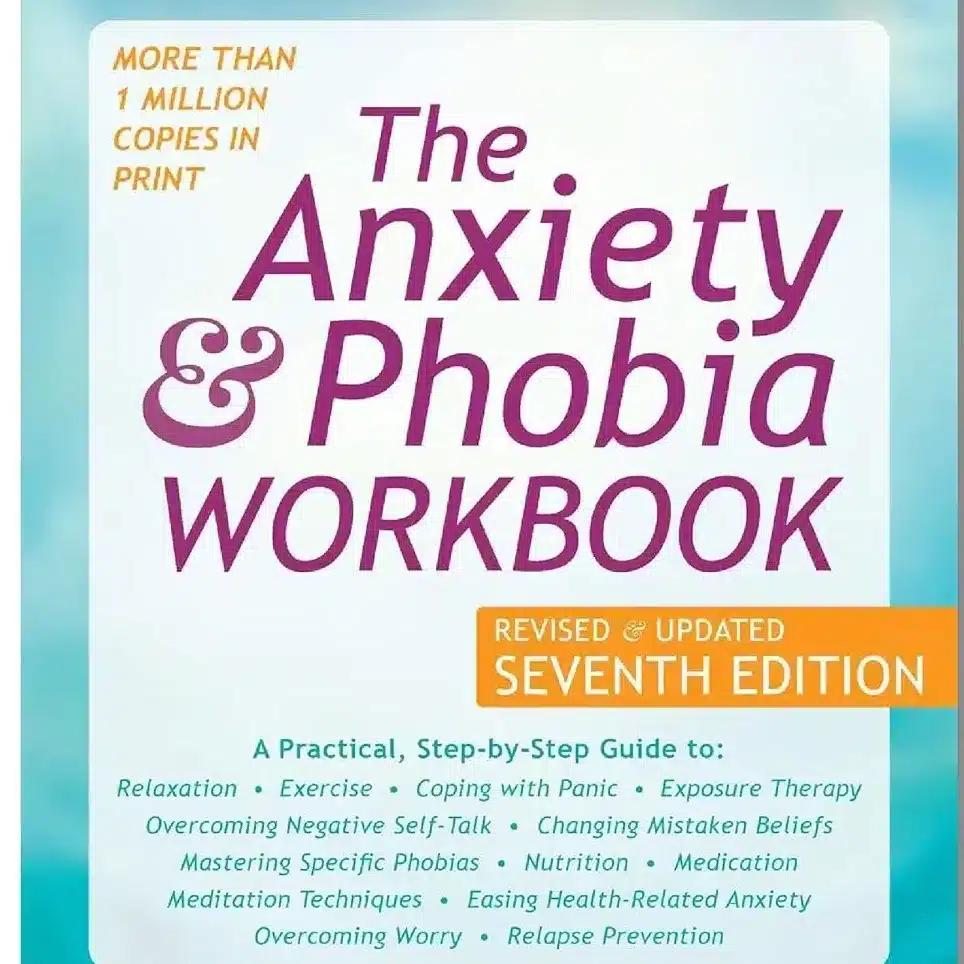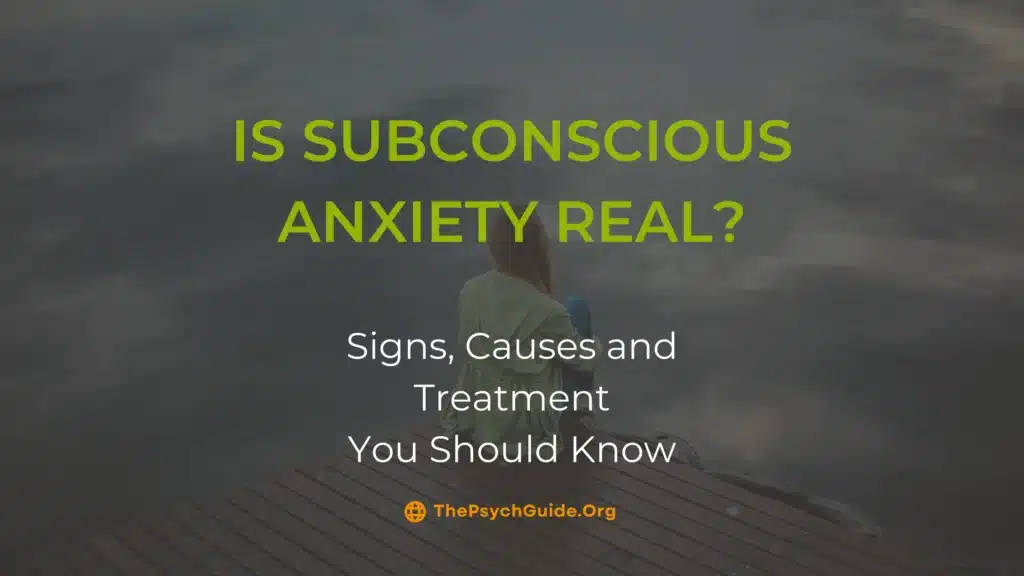Have you ever found yourself feeling on the edge, even when everything looks good in your life? Or have you experienced constant worry or unease without any reason and can’t shake it off? If so, then you may be experiencing Subconscious Anxiety. Unlike other forms of anxiety, subconscious anxiety works beneath the surface.
It is understandable that many of us experience anxiety in this fast-paced, technologically-driven world, as studies reveal that anxiety disorders are the most prevalent type of mental illness, affecting up to 33.7% of people at some point in their lives. Understanding and addressing it can make a difference in your overall well-being.
It might be possible that you have heard about subconscious anxiety for the first time and are wondering: Can anxiety be subconscious? If so, then this article is the right read for you. In this blog post, you will get to read about subconscious anxiety meaning, subconscious anxiety symptoms, its causes, its impact on your mental health, and how to treat it with all the practical tips and lifestyle changes.
Table of Contents
ToggleWhat is Subconscious Anxiety
Subconscious anxiety is also known as ‘unconscious, low-grade, or chronic anxiety’ and is the type of anxiety that you are not fully aware of while having it. It’s like you feel that something is wrong but you don’t know the reason for this uneasiness and discomfort.
There is a tricky part. This type of anxiety can also make you believe that it is just your personality trait to feel periods of discomfort, uneasiness, and stress. But it is subconscious stress and anxiety when you feel continuous restlessness and nervousness as background noise.
Diagnosis
The field of mental health does not formally recognize subconscious anxiety as a diagnosis. However, anxiety can indeed develop subconsciously without a person realizing it.
Subconscious anxiety is challenging to identify due to your conscious mind not being aware of the anxiety you are feeling and what the reason could be behind these symptoms of anxiety. However, mental health professionals can understand and diagnose it using a combination of clinical expertise, individual discussions, and assessment tools, even when anxiety functions at a subconscious level.
Symptoms of Subconscious Anxiety?
To diagnose and address subconscious anxiety, we first need to know its signs so when anxiety strikes, we are already aware of what the subconscious anxiety attack symptoms are.
Physical Signs
Subconscious anxiety physical symptoms include:
- You may feel muscle tension or aches in various muscle groups, particularly the neck, shoulders, and jaws.
- Subconscious anxiety results in difficulties with sexual arousal, intimacy, or achieving orgasm.
- You may feel involuntary shaking or quivering of hands, legs, or voice.
- Subconscious anxiety may result in an upset stomach or indigestion, such as nausea, abdominal pain, or diarrhea.
- Rapid heartbeat or pounding heart. You may notice an increase in heart rate or fluttering sensation in the chest.
- Feeling excessively sweaty or having hot flushes even in cool temperatures.
- Difficulty falling asleep (insomnia), staying asleep, or waking up frequently throughout the night.
- You may feel dizziness or lightheadedness, especially in crowded or stressful situations.
- You may have shortness of breath and hyperventilation.
- Frequent or persistent headaches, ranging from mild to severe.
- You may feel tingling or numbness and pins and needles sensations in your hands, feet, or face.
- Chronic fatigue is also a symptom of subconscious anxiety. You may feel drained both physically and mentally without a clear reason.
Psychological Signs
Psychological symptoms of subconscious anxiety are:
1. Difficulty Making Decisions
Anxiety can make your thoughts fuzzy or clouded over. It affects your focus and concentration and you may have trouble making decisions. This brain fog affects you so much that you will struggle to make decisions even on a daily basis like what to wear and what to do.
2. Rumination and Intrusive thoughts
You may have the same disturbing and intrusive loop of thoughts over and over that can be frightening, as these intrusive thoughts focus on sex, violence, or harmful and dangerous situations. According to the research, ruminating thought patterns are a risk factor as well as a common symptom of anxiety and depression, and they can also worsen these conditions.
3. Distraction
According to research, anxiety impairs your ability to process new information and make plans, so you will be easily distracted and unable to concentrate.
4. Difficulty in Managing your emotions
You may have overwhelming emotions due to subconscious anxiety and you may find it difficult to manage them. You might not be able to handle situations where just little things go wrong, as anxiety working in the background will make it difficult for you emotionally and you will feel on the edge and tense.
5. Pessimism
As anxiety activates your ‘fight and flight mode’, it may make you prepare for the worst, and this is known as ‘defensive pessimism.’
Subconscious anxiety may make you think that everything could go wrong so you might create a backup plan before the worst happens, even though everything is going right.
6. Perfectionism
Do you want perfection in everything? This may be a subconscious anxiety symptom. Perfectionism often comes from a fear of making mistakes and being rejected or criticized. Needing perfection in everything, such as relationships, work, and daily life, can have negative aspects and consequences.
How Subconscious Anxiety Differs from Conscious Anxiety?
As many people get confused with subconscious anxiety, they wonder, Can you subconsciously have anxiety? So to clear up this confusion, we can look at the differences between conscious anxiety and subconscious anxiety to better understand them.
| Conscious Anxiety | Subconscious Anxiety |
| Conscious anxiety can be defined as the feelings of worry, distress, and fear that are within the person’s awareness. | Subconscious anxiety involves feelings of stress, worry, and fear that the person is not fully aware of. |
| It is triggered by specific events and situations. | It stems from past experiences or unknown stressors. |
| Its worries are often focused on real or imagined threats in the present and future. | It is the result of negative beliefs, thoughts, or experiences that do not relate to the present or future. |
| Conscious anxiety is visible. | Subconscious anxiety is hidden. |
| It’s easier to diagnose due to the conscious awareness of a person having it. | It’s difficult to diagnose due to the person going through it not knowing that they are having it. |
What Causes Subconscious Anxiety?
There might be multiple causes that trigger subconscious anxiety attacks. Let’s discuss them in detail.
1. Past Fears or Repressed Memories
Subconscious anxiety is caused by past memories and fears that are repressed. When a person experiences any form of fear or traumatic event, the memories of those events or fears are stored in our subconscious mind to protect us. But this results in anxiety and distress because, even in our subconscious mind, those suppressed memories work in the background, causing anxiety.
2. Personality traits
Some personality traits, such as negative thinking and wanting perfectionism in everything, also lead to subconscious anxiety. If a person wants perfection in everything and ruminates on negative thoughts, this contributes to feelings of anxiety.
3. Unresolved Childhood Pattern
If you have unresolved childhood issues, such as experiencing trauma, abuse, loss, or being neglected in your childhood, this can lead to feelings of anxiety when you reach adulthood as your subconscious mind stores all information related to your past experiences. So these subconscious feelings manifest as subconscious anxiety and you are not aware that you are having unresolved childhood traumas that need to be healed.
4. Negative self-talk
Negative self-talk also manifests in the form of subconscious anxiety when a person has repeated patterns of negative self-talk such as ‘I don’t deserve this’, ‘I am not good’, and ‘I am not going to succeed’. These thoughts, without your conscious awareness, trigger anxiety.
5. Environmental stress
Environmental stress such as financial problems, work pressure, problems in relationships, loss of someone, and rejection can also lead to subconscious anxiety as it activates fight and flight mode.
6. Genetics
Many people may be prone to subconscious anxiety due to their genetics. If they have a family member who suffers from anxiety, then it is more likely that they are going to also have it.
Impact on Mental Health and Well-being
Subconscious anxiety affects mental health and well-being as it runs behind the scenes, working on your subconscious mind.
How does it affect your daily life?
- Subconscious anxiety can lead to social isolation and missed opportunities, as you might find yourself avoiding situations or activities that trigger your anxiety, even if they’re important or enjoyable.
- You might withdraw from relationships or struggle with trust and communication due to the constant worry and negativity associated with subconscious anxiety, which can make it hard to connect with others on a deeper level.
- You might find yourself putting off tasks or struggling to meet deadlines, and this can affect your work productivity at school, office, or at home.
- Subconscious anxiety may make it difficult for you to fall asleep and disrupt your sleeping pattern due to subconscious thoughts that constantly run through your mind.
- Subconscious anxiety can undermine your confidence and self-esteem as it can fuel a harsh inner critic, leading to negative thoughts about yourself and your abilities.
Relationship with other Mental health Conditions
Subconscious anxiety occurs with other mental health conditions, making it challenging to diagnose and address it.
- The low mood and hopelessness that come with depression are worsened due to underlying subconscious anxiety.
- Symptoms of panic disorder, like sudden episodes of fear, rapid heart rate, shortness of breath, and chest tightness, can be triggered by subconscious anxiety.
- As OCD has characteristics of repetitive thoughts and compulsive behaviors, subconscious anxiety can intensify these patterns.
Long-term Consequences if Left Unaddressed
Subconscious anxiety can have long-term consequences if left untreated. It can affect various areas of life.
- It leads to difficulty in having healthy relationships with family, partners, and friends due to underlying emotional and behavioral changes happening due to subconscious anxiety.
- Individuals with unaddressed subconscious anxiety may use substance abuse, such as drugs and alcohol, as a coping mechanism, leading to further health problems and addiction.
- Unaddressed subconscious anxiety weakens the immune system and increases the risk of other health problems, such as heart disease, high blood pressure, and digestive issues.
Subconscious anxiety is treatable. If you feel like you are having it, seek help from a professional therapist.
How to Treat Subconscious Anxiety?
When many individuals learn that they have this type of anxiety, they tend to find out how to deal with subconscious anxiety. There are many treatment options available for it; let’s read them out.
1. Cognitive Behavioral Therapy (CBT)
CBT can help treat subconscious anxiety as it focuses on changing negative thoughts and patterns that contribute to anxiety. The therapist will identify these underlying thoughts and behaviors and then develop a plan to change these negative patterns.
Research shows that CBT provides long-term relief from anxiety symptoms and is an effective treatment for subconscious anxiety.
2. Exposure Therapy
Exposure therapy is also a great way to deal with subconscious anxiety.
If you want to know how to calm subconscious anxiety, Expose yourself to the thing slowly and gradually that you are afraid of and feel anxious about. The idea is to overcome subconscious anxiety about the thing you are afraid of. It’s not easy but it could be an effective way to deal with subconscious anxiety.
For example, if someone faces subconscious anxiety in social situations, exposure therapy starts with small interactions and gradually progresses to more challenging scenarios like group gatherings or public speaking.
3. Hypnotherapy
Hypnotherapy works on the subconscious mind by repeating the affirmations to get rid of anxiety or any fear. This therapy can help access subconscious thoughts and emotions linked to anxiety and work on modifying them.
For instance, a person struggling with social anxiety may undergo hypnotherapy sessions where affirmations are repeated to instill confidence and reframe negative thought patterns. By repetitively reinforcing positive affirmations during the hypnotic state, the therapy aims to reshape the individual’s perception of social situations, fostering a more positive and less anxiety-inducing mindset over time.
4. Medications
Medications can also be effective in treating subconscious anxiety, as there are many anti-anxiety and antidepressant medications available. These medications include Prozac, Zoloft, Paxil, Lexapro, and Celexa. It can treat the symptoms of anxiety, such as rapid heartbeat and difficulty breathing, as they change the levels of neurotransmitters in the brain, reducing the anxiety symptoms.
Note: It is important to speak to a healthcare professional before taking any type of medication.
How to Control Subconscious Anxiety?
After reading treatment options, you may be wondering how to calm subconscious anxiety and control it. Let’s figure out the practical tips and lifestyle changes that will help us control subconscious anxiety.
Identify your Triggers
Identify your triggers that are causing anxiety, because when we get to know what is causing us anxiety, we will be able to avoid these triggers and deal with them in a healthy way. For example, if you feel anxious due to height or have a height phobia, you can avoid places that are at height to avoid triggering anxiety. Alternatively, you can opt for gradual exposure therapy to desensitize yourself to the trigger over time.
Talk to someone you Trust
You can talk about your anxiety and negative thoughts to someone you completely trust, as this can help you overcome it because while talking about your anxiety, you are bringing it into your conscious brain. This helps in understanding and addressing it better. Talking to someone about your anxiety can also make you feel at ease and supported.
Journaling your thoughts
Having anxiety? Why not write it down and let it all out? Writing can be a therapeutic way to process emotions and gain insights into recurring patterns of anxiety. Take a few moments every day to write about what is troubling you and causing you to feel anxious. Writing deep thoughts that are in your subconscious mind will shift your mindset and help you find a solution instead of focusing on the problem.
Relaxation Techniques
There are many relaxation techniques that can be the best options for controlling subconscious anxiety. These relaxation techniques, such as guided meditation, guided imagery, and deep breathing, focus on positive thoughts, images, and breathing, helping the person to relax and alleviate symptoms of anxiety by calming the subconscious mind.
Get enough sleep if you want to control and tackle your anxiety, because when you sleep well, you are better able to deal with stressful situations, and sleeping also resets your body system and makes you feel peaceful and calmer. Make a good sleep routine by turning off all distractions and stopping screen time one hour before sleeping to get better and sounder sleep.
Exercise is one of the best ways to get rid of anxiety, as it releases endorphins, the feel-good hormones that are the natural mood boosters that make you happier and reduce anxiety. A research study shows that doing regular exercise can help reduce anxiety symptoms.
You can do aerobic exercises like cycling, running, and swimming. There are also many strength training exercises, such as weightlifting, squats, push-ups, lunges, and jumping jacks, that can help reduce anxiety. You can also do breathing exercises for anxiety.
Be patient with yourself while dealing with subconscious anxiety, as subconscious thought patterns are sometimes the result of deeply rooted past experiences and memories, so it takes time for them to heal. This is not an overnight thing to get rid of subconscious anxiety.
Therapy providing organizations
There are many organizations that can provide therapy for anxiety.
Talkspace provides online therapy with licensed therapists through video chat, messaging, and phone calls. Their platform offers diverse treatment options and flexible scheduling, making it accessible to individuals worldwide.
7 Cups of Tea is a global online platform connecting individuals with trained volunteer listeners for any type of emotional support such as for anxiety and depression.
Anxiety and Depression Association of America (ADAA)
The ADAA provides educational resources, treatment referrals, and support groups for anxiety disorders.
This website provides a wealth of information and resources on mental health conditions, including anxiety.
This website allows you to search for therapists in your area by location, insurance, and treatment specialization (e.g., anxiety, subconscious anxiety).
Self-Help Books
Self-help books can be beneficial for treating anxiety. There are many self-help books that can help.

It is a comprehensive and practical guide for anyone who wants to overcome fear and anxiety. The book provides a comprehensive overview of fear and anxiety, including their causes, symptoms, and treatments. It also outlines a step-by-step plan for overcoming fear and anxiety through self-help strategies and techniques.

Rewire Your Anxious Brain: How to Use the Neuroscience of Fear to End Anxiety, Panic, and Worry
This audiobook is by Susannah Mars, Catherine M., and Elizabeth M. This book provides clear, concise examples of how to use both of these brain pathways to effectively manage fear. You will learn more about how anxiety arises in the brain as you listen, and you will feel more equipped and driven to conquer it, too.

The Anxiety and Phobia Workbook
This workbook is by Edmund J. This book provides you with a plethora of tools to manage your anxious thoughts, stop negative self-talk, and calm down. These tools include:
- Breathing and relaxation exercises.
- New research on exposure therapy for phobias.
- Lifestyle, exercise, mindfulness and nutrition tips.
Conclusion
As subconscious anxiety works beneath the surface, we can have it without knowing it, and it can significantly impact our daily lives. By bringing our awareness to it, we can work to take control and find peace and balance with our subconscious mind.
For a normal person who has no idea about anxiety or depression, it could be difficult for them to diagnose that they have subconscious anxiety. But we can play a part by talking about these mental health issues and helping people look for signs of anxiety, depression, or any other mental health issue.
If you have subconscious anxiety, try to address it and take treatment for it, and if you doubt a person you know is going through it, give accurate information to them about it. This is the way we can create a world where we might have fewer people with mental health issues in the future.
FAQs

1. Can subconscious anxiety cause nausea?
Yes, anxiety can also make you nauseous, as it prepares you for real or imagined threats and activates your fight-and-flight response, leading to various physical symptoms, including nausea. The mind-body connection is powerful, and anxiety can manifest in gastrointestinal discomfort, contributing to feelings of nausea.
2. Can subconscious thoughts cause anxiety?
Absolutely. Subconscious thoughts can trigger and cause anxiety as subconscious thoughts are developed due to negative beliefs, past traumas, and unresolved conflicts. These thoughts act like programmed scripts and they automatically cause emotional and physiological responses such as repetitive worry and rumination, leading to anxiety.
3. Is anxiety subconscious?
Anxiety can be conscious or subconscious. Conscious anxiety is when you are aware that you have anxiety and subconscious anxiety is when you are not aware of having anxiety as it is in your subconscious mind.
4. Are subconscious anxiety and silent anxiety attacks the same?
Subconscious anxiety and silent anxiety attacks are closely related but are not exactly the same. Subconscious anxiety is more like constant background noise, uneasiness, and nervousness without a clear trigger, and silent anxiety attacks are like acute episodes of intense anxiety triggered by certain situations.

